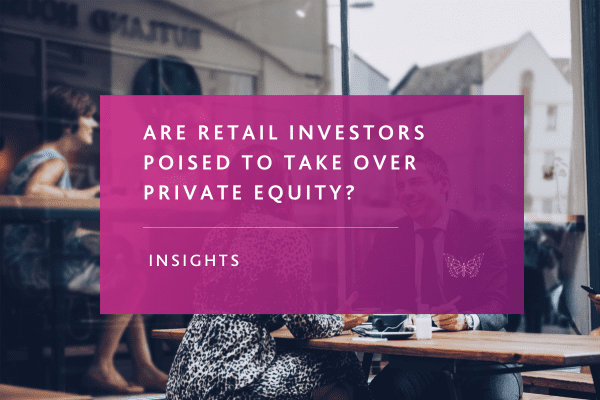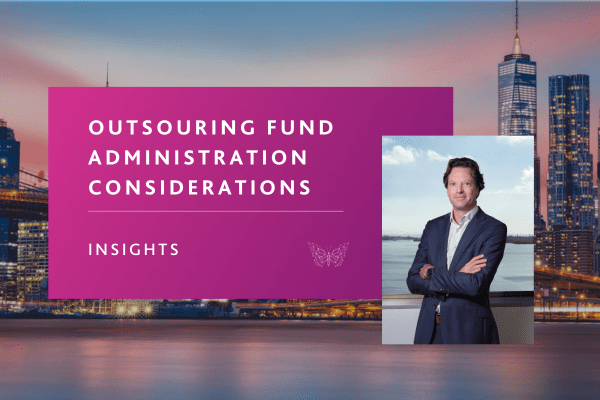Private wealth may be the next big source of capital for alternatives, but understanding what makes these investors different from institutional investors is key.
Recent reporting suggests that after a sluggish 2022 in stock and bond markets, many private wealth advisors are putting their focus on alternatives. CNBC reports that “nearly 30% of advisors are actively investing in or seeking alternative investments.”
While this could affect all alternatives, data suggests that Private Equity is the most sought-after asset class for investment advisors. In addition, another recent survey found that 41% of family offices “were planning to increase their exposure to PE over the course of this year.”
This increase in demand among advisors and the high net-worth individuals (HNWI) that make up their client base coincides with increased interest from firms in finding new sources of capital. The result could be a major change in who these funds market to and how they are structured.
While this increased interest in Private Equity (as well as other alternatives) could create new opportunities, it also presents difficulties, as these non-traditional sources of capital require education on all sides.
Is it worth it for firms to pursue retail investors? To answer this question, we need to understand the conditions that brought about this drive among wealth advisors to allocate toward alternatives.
Why retail investors are considering alternatives
According to the 2023 Global Private Equity Report by Bain & Company, the increased interest in PE has to do largely with consolidation among public companies. According to the report, “The number of public companies has declined in recent decades, leaving public investors closed off from large parts of the global economy.”
While HNWIs and their advisors may in the past have been able to adequately diversify through public markets, now they may have to look elsewhere. Advisors are also aware of the performance of Private Equity, which appears even more impressive when compared to a sluggish stock market.
The Bain report notes that private markets “are outpacing public returns over every time horizon, while alternative funds provide access to the broad global economy and the fullest range of asset classes.”
The report concludes that wealthy individuals and their advisors will continue to be drawn to alternatives in a quest for diversification and better returns. “Mixing in private assets would give advisers and their clients additional options for building portfolios that pair attractive returns with new forms of diversification.”
Data from a survey by the Financial Planning Association agreed with this assessment of diversification as a major driver. “Among respondents who are using alternatives on behalf of their clients, 55 percent cited diversification as one of their objectives, followed by 41 percent who are looking for risk mitigation.”
At the same time, FPA notes, “competitive pressure and scalability of alternative products are driving down expenses.” If alternative managers are able to offer HNWI investors lower management fees, their funds will become even more attractive.
Regulatory considerations are also pushing retail investors toward alternatives, specifically PE. Traditionally, only institutional investors have had access to these funds, but that may be changing. The Bain report notes that in 2020, “the US Securities and Exchange Commission broadened the definition of ‘accredited investor’ beyond wealth-based criteria to include individuals with sufficient ‘knowledge and expertise’ regarding an investment.”
The result is a lowering of the monetary threshold for investment in PE, allowing those who may not be considered HNWIs but who have the capital to commit to a PE fund to take advantage. There are additional regulatory concerns for buyout funds, and the more investors a fund has, the greater the administrative burden, so many funds are likely to continue to maintain relatively high minimum investment levels. But catering to what Bain calls the “large untapped market in the broad middle” could present PE firms with a real opportunity.
Why PE firms want retail investors
At the same time retail investors and their advisors have become more interested in Private Equity (and have been given the ability to pursue it), General Partners have needed to explore other sources of capital. This is due in part to the poor performance of public markets.
As noted by Pitchbook, “the fall in public market valuations has left institutional investors overallocated to private markets.” Known as the denominator effect, this means that because valuations in public companies have fallen, institutional investors that had operated by strict percentages now have a greater portion of their overall value in private funds, which haven’t suffered as public markets have. These institutional investors therefore need to scale back investments in alternatives to preserve balance.
The Bain report notes that PE’s own success and growth have created a scarcity of capital. “The long-term opportunity private equity presents may be bigger than the traditional sources of capital can support. That explains why the industry has been so assiduously expanding relationships with the massive sovereign wealth funds in capitals around the world and seeking to tap the legions of individual investors who control half of all wealth globally.”
In terms of how much capital is available from retail investors, Bain notes, “Individual investors hold roughly 50% of the estimated $275 trillion to $295 trillion of global assets under management (AUM). Yet those same investors represent just 16% of AUM held by alternative investment funds.”
So how can PE funds cater to advisors and individual investors in order to take advantage of an increased demand that comes at a time of increased competition for capital? There are some hurdles managers may not have considered.
Why PE funds might have trouble attracting investors
Retail investors, regardless of their level of wealth, have specific considerations that set them apart from institutional investors. One of the biggest is the issue of liquidity. Depending on the type of PE fund, the commitment could be 10 years or more, which is beyond what many individual investors are used to.
“For an adviser who wants to get into alternatives, it’s hard to imagine your first alternative will be the typical eight- to 12-year private equity locked-up fund that you’re not going to know how it’s performing for four to five years,” one wealth advisor told Pitchbook.
“It’s just really tough to get out of some of these funds,” echoed a financial advisor interviewed by CNBC.
What is the solution for retail investors who want the flexibility to sell shares or access capital as market conditions change? Some firms focused on later-stage funds can offer shorter life cycles, while other firms are experimenting with semi-liquid funds that allow investors “to redeem a certain amount of their cash from a normally illiquid asset class, potentially making the fund more suitable for rich retail clients or their wealth managers.”
Another option is interval funds, which periodically offer to repurchase a percentage of outstanding shares, giving investors the chance to cash out in a limited way. FPA also notes some interval funds have lower fees, which could be enticing to individual investors, as “fees and expenses” was the second most-common response in their survey to a question about concerns regarding alternatives, behind only “lack of liquidity.”
Though these types of funds could help ease concerns about liquidity among wealthy investors and their advisors, the issue is far from resolved. As Bain notes, “managing the liquidity needs of individual investors will inevitably require more trial and error by GPs. It will also mean building new capabilities in areas wholly unfamiliar (if not anathema) to most private equity firms: public relations, customer service, and traditional forms of marketing to a mass audience.”
These capabilities, many surrounding marketing and communication, are the second major hurdle for firms looking to target retail investors. Bain notes that “the industry has done little historically to create the distribution and marketing infrastructure required to reach individuals and build awareness with them.” Brand recognition may be almost nonexistent regarding PE firms, whose reputations won’t go as far with retail investors as they might hope.
Education will also be a major issue when targeting investors who aren’t as familiar with the sector. Investors need to understand the financial commitment, risks, fee structure, and due diligence associated with Private Equity, and while some advisors may be good at communicating these elements with their clients, others may be just as clueless themselves.
CNBC notes that one options is a fund of funds, where a private wealth firm “acts as a general partner by investing on behalf of 100 clients in one deal.” The advantage presented by this strategy for PE firms is that it cuts down on the number of advisors who need to be targeted and individual relationships that need to be formed. However, due diligence will have to be performed on both sides.
This notion of bringing retail investors together to invest in private markets is also being pursued by companies such as Moonfare that aim to offer more individuals access to alternatives. These companies may face increased regulatory scrutiny as they grow, and only increase the need for due diligence and AML/KYC on the part of PE firms to ensure all information is accurately communicated to the necessary parties.
Even knowledgeable and savvy retail investors who fall just short of HWNI status may require education, specific marketing techniques, and greater access to information, all things that could increase a fund’s overhead. But if done right, it’s possible to efficiently target capital sources that can lead to growth.
How JTC’s solutions can help
An increased number of investors, additional marketing expenditures, additional disclosures, and many other aspects of catering to wealthy individuals can create significant burdens in terms of overhead and staffing. The right fund administrator can ease that burden by increasing efficiency and providing necessary expertise.
For retail investors and private wealth advisors, transparency will be an important issue. JTC’s secure online portal offers 24/7 access to fund and investment information from anywhere in the world. Our data processing technology can also greatly enhance efficiency, helping funds scale quickly, and we offer AML/KYC, fast onboarding, and operational due diligence services as well.
And unlike many fund administrators, we have a reputation among HNWIs and wealth advisors, with a robust private client business. We work with family offices and investment advisors from around the world and understand their needs. We can help PE managers provide what these investors are looking for so you can connect with the investor base that will push your fund into a new era of growth.
Stay Connected
Stay up to date with expert insights, latest updates and exclusive content.
Discover more
Stay informed with JTC’s latest news, reports, thought leadership, and industry insights.
Let’s Bring Your Vision to Life
From 2,300 employee owners to 14,000+ clients, our journey is marked by stability and success.



















